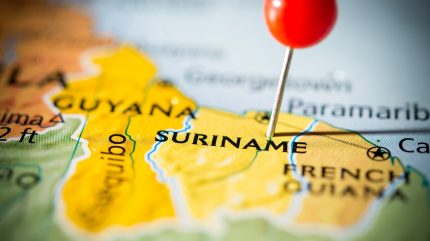
Equinor, alongside ExxonMobil, has transferred its ownership in a deepwater exploration block off the coast of Suriname to Hess, reported Reuters.
This move marks Equinor’s exit from the South American nation, aligning with its strategy of focusing on core production areas.
ExxonMobil, the former leader of the consortium, has handed over Block 59’s operation to Hess in a non-monetary transaction.
In an email, an Equinor representative said: “We have decided to withdraw from the deepwater Block 59 exploration license in Suriname and we do not intend to seek further exploration opportunities in the country.”
Despite this transfer, ExxonMobil maintains its presence in Suriname through Block 52.
“We fulfilled all our work commitments for the block and continue to progress the evaluation of our Suriname exploration acreage,” an ExxonMobil spokesperson said.
How well do you really know your competitors?
Access the most comprehensive Company Profiles on the market, powered by GlobalData. Save hours of research. Gain competitive edge.

Thank you!
Your download email will arrive shortly
Not ready to buy yet? Download a free sample
We are confident about the unique quality of our Company Profiles. However, we want you to make the most beneficial decision for your business, so we offer a free sample that you can download by submitting the below form
By GlobalDataHess now holds full ownership of the licence, with no financial exchange reported between the companies, as per Equinor.
Over the past six years, Equinor has withdrawn from approximately 20 countries, focusing its operations on exploration.
The company’s departure from Russia in 2022 due to the conflict in Ukraine, and its recent decisions to divest from Nigeria and Azerbaijan, are part of this strategic retraction.
Upon completion of ongoing deals, Equinor’s international presence will be limited to fewer than ten countries outside Norway.
This strategic shift contrasts with the global expansion initiated by Equinor’s former CEO, Helge Lund, now the chair of bp.
The change in direction occurred after Equinor, previously known as Statoil, partially privatised in 2001.
In 2023, Equinor reported that 34% of its oil and gas production was from international operations, with the US being the largest contributor outside Norway, followed by Angola, Brazil and Algeria.
Despite shrinking its geographical footprint, Equinor plans to increase its international production by 15% from 2024 to 2030, targeting 800,000 barrels of oil equivalent per day.
This growth is expected to come primarily from new fields in Brazil, the US and the UK.
In addition to its oil and gas ventures, Equinor is exploring renewable energy opportunities in new markets including Japan, with a particular interest in offshore wind projects.


